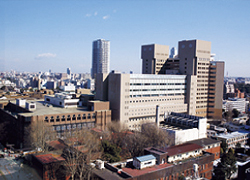Overview

What do you imagine when you hear the phrase “Faculty of Medicine”? Perhaps you picture a physician wearing a white coat and holding a stethoscope, or perhaps a researcher shaking test tubes in a laboratory. However, medical science encompasses a vast range of topics—from the molecular structure of the proteins involved in cancer development, to the functional integration of organs in the human body, to issues related to public health and global health.
After graduating, most medical students in the Faculty of Medicine will work as clinicians. Because the overriding goal of clinical practice is ensuring optimal support of human well-being, clinicians are expected to understand the mechanisms of disease at the molecular level and the complex pathological interactions among multiple organs. Just as important, however, is appreciating the central role of patients in medicine. Active collaboration between patients and healthcare providers is essential when designing personalized, comprehensive care. The educational goals of the Faculty of Medicine thus emphasize a philosophy of patient-centered care. Although rapid advances in medical science and their translation into medical practice have greatly improved disease prevention, diagnostic accuracy, and treatment outcomes, we must remember that not all diseases can be treated effectively and that some have devastating effects on patients. Therefore, in addition to ensuring the best clinical outcomes for patients, physicians must also consider the mental, ethical, and social dimensions of patient care.
Appreciating the relationship between basic and applied medicine requires an understanding of the history of medicine. When bacterial research was at the forefront of medicine, discoveries in bacterial biology—and the understanding of the implications of such breakthroughs for human disease—advanced at a breakneck pace. However, Fleming's discovery of the first antibiotic, penicillin, came fifty years after the advent of modern bacteriology. We expect a similar gap between initial discoveries of fundamental biological phenomena and their subsequent application to disease prevention and treatment, even in rapidly advancing fields such as molecular biology and cell biology. Fortunately, recent progress in data science and artificial intelligence has accelerated the process of translation in medicine. Nevertheless, progress from breakthroughs to noteworthy improvements in disease prevention and treatment will continue to require patience.

Even if new means to prevent and treat diseases are developed, their application to patients might be affected by social, economic, and political factors. Social medicine is the discipline responsible for analyzing and addressing pressing issues such as trends in disease prevalence, the challenges of an aging society, the effects of environmental pollution on human health, and health differences between high-income countries and low- and middle-income countries. The importance of these topics increases as societies grow more complex. The Graduate School of Medicine therefore makes every effort to provide an ideal environment for educating specialists in social medicine.
Until the middle of the twentieth century, infectious diseases were the leading cause of death in Japan, and average life expectancy was less than fifty years. After the discovery of antibiotics, the number of cases of severe infectious disease dramatically declined, and cerebrovascular diseases became the leading cause of death. Later, treatment of hypertension and stroke improved, deaths due to strokes decreased, and cancer became the leading cause of death. This illustrates how successful management of a primary life-threatening disease results in the emergence of new diseases, which then become the next targets of medicine. After effective cancer treatments are discovered, age-related diseases such as Alzheimer's disease are expected to take center stage. Then the pandemic of COVID-19 emphasized the importance of infectious disease again and revealed the magnificent value of new technology such as RNA biology and telemedicine. Medical science must thus address the present medical issues of greatest concern while remaining aware of potential future challenges to human health. Such vigilance requires that we accumulate diverse knowledge and resources that will likely prove useful for emerging and as-yet-unknown health problems. The mission of the Faculty of Medicine is to combat disease by developing and utilizing new diagnostic and treatment technologies and to educate the researchers and practitioners who will decide the future of medicine.
Departments

School of Integrated Health Sciences
Types of Degrees
School of Integrated Health Sciences: Bachelor of Health Sciences
Contact
Office of International Academic Affairs: oiaa AT m.u-tokyo.ac.jp








